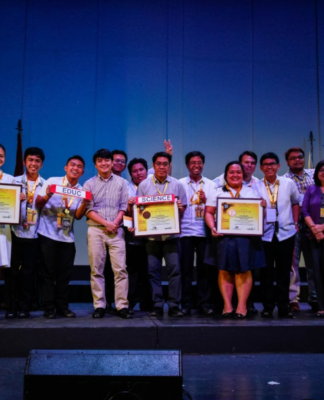 IT WAS, undoubtedly, my first and last encounter with the Lady Polyester.
IT WAS, undoubtedly, my first and last encounter with the Lady Polyester.
While on the lookout for a credible source for my last column regarding Thomasian Palanca winners and the defunct Center for Creative Writing and Studies (CCWS), I chanced upon an abrupt interview with Dr. Ophelia Alcantara Dimalanta, the University’s then writer-in-residence who was affectionately called “Ma’am Ophie.”
Greeting me with a warm smile, she beckoned me to a seat next to her paperwork-laden table. Perched on top was the laudable title bestowed on her by the Rector, emblazoned on a white plaque with her name inscribed above it.
“Not all universities can have that title [writer-in-residence] unless there is one reputable writer in its community,” said Ma’am Ophie, who humorously took back the statement. “Ang yabang ko naman pala pag sinabi ko ‘yan.”
Though this title spoke much of literary grandeur, given that she was handpicked among a pool of other excellent writers who hail from the University as well, Ma’am Ophie did not exhibit that haughty, snobbish air established poets are known for, nor was she visibly eccentric or contemplative and brooding.
In fact, she was motherly at best. She spoke to me as if she was talking to long-lost granddaughter who suddenly had a change of heart and decided to pursue her sidetracked literary dreams.
“You should let me read some of your works,” she said. “I’m encouraging you to create more!”
Nevertheless, she still kept her “professor” demeanor, keeping tabs on my grammar lapses and pronunciation, like how I incorrectly pronounced Quadricentennial as “Quadricen-ti-nial.”
“Sorry, but my being a professor just comes out every time I hear somebody mispronounce the word quadricentennial. It should be ‘quadricen-TEN-nial’,” she reprimanded.
What should have been a talk merely on the lackluster literary performance of Thomasians stretched to all sorts of topics, ranging from the recent Varsitarian-Thomasian Writers Guild tension to the quadricentennial play she was writing with Varsitarian publication adviser Joselito Zulueta.
Ma’am Ophie mused on the tight budgets the administration has implemented, thus limiting the means of further harnessing the creative minds of the students. Stating that she was “a little disenchanted” by this lessened support, she still hopes that budding writers have it in their heart to write despite the lack of aid from the academe.
The abolishment of the CCWS, which also suffered from the budget setback, could’ve been a massive help for students who are on the brim of discovering their knack for literary writing.
“I don’t want to be blamed for the lukewarm turnout of creative writing in the University, because in truth, it still depends on the students,” she said.
Concerning the growing clash between the Varsitarian and the TWG, she hopes nothing but unity for the two writing groups. For her, an alliance would generate a stronger and greater writing force. Also, she wishes to recruit even more writers to the pack, in case this plan is taken into action.
Prior to her untimely death, Ma’am Ophie was also planning to set-up another Thomasian Writers Workshop reminiscent of last summer. In fact, had her workload comprising mainly of teaching and writing lessened, she would’ve started more projects.
The musical play she was writing with Zulueta about Miguel de Benavides, which was to be shown later in the quadricentennial celebrations, supposed undergoing revisions that time.
“My imaginative touches to the play did not sit well with them [UST administration], but I was not writing a historical account, so there had to be figments of imagination there,” she claimed, disconcerted that her writing was deemed “aprophical”. “I wanted to show the human side of Benavides, the many layers of his personality, to stay true to the fact that plays must have a particular issue to hold on.”
Ma’am Ophie had probably more unfinished plans she would’ve wanted to see into fruition, but the wave of support which seemed to smother her with love as transcendental as her famous poetry verses could only echo one thing ? as her words burn into eternal brightness, so shall all who knew her meet in mutual purpose.
















